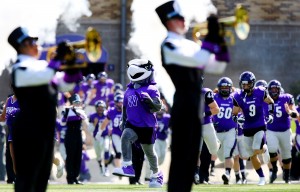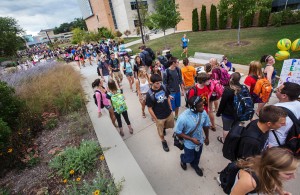
Willie Warhawk leads the team onto the field for the 2015 home opener. (UW-Whitewater/Craig Schreiner)
The University of Wisconsin-Whitewater’s annual economic impact on the region is more than $407 million. That’s according to a new study, which looked at the campus’s effect on the economy in Walworth, Rock and Jefferson counties.
Taking into account university spending on payroll, supplies and capital investments, and spending from students, faculty, staff and visitors, UW-Whitewater accounts for $407,177,739 in economic activity and supports 4,352 jobs.
“We’re proud of UW-Whitewater’s profound impact on the region,” said Chancellor Beverly Kopper. “Not only are we changing lives by offering students robust academic, cultural and athletic experiences, but UW-Whitewater also brings money, employment and volunteerism into the area. This economic study further demonstrates what a tremendous investment the campus is for our community and the people of Wisconsin.”
In addition to the regional economic impact, UW-Whitewater generates an estimated $17,914,768 in annual tax revenue for the state, including sales tax, property tax and income tax.
James Langnes III, a student majoring in finance who also serves as a member of the UW System Board of Regents and City of Whitewater Common Council, lauded the town-gown relationship.
“There are many opportunities for students to find employment in the community and surrounding area,” he said. “The college students benefit from these jobs because they can earn money while gaining real-world experience. In turn, those students benefit the region because of the economic activity that is spurred from the students and impact of the university. The partnership of UW-Whitewater and the city generates a breeding ground for the successful leaders and innovators of tomorrow.”
“The economic engine of Whitewater is really the university,” said Jeffery Knight, president and CEO of the Greater Whitewater Committee and owner of Knight Public Affairs. “The students, staff, professors and leadership from the university have become an integral part of our community. As the largest employer in town, the multiplier effect of spending by those employees has a profound impact on all our businesses. Many of our businesses provide services or products to the university community on a daily basis. This is a strong report that emphasizes what many of us have believed for a long time. This university does an amazing job of educating our young adults into tomorrow’s leaders, but has a profound economic impact on the city of Whitewater and its diverse business makeup.”
 Lacey Reichwald, a 2008 graduate and owner of the SweetSpot Cafe and the SweetSpot Bakehouse, said many of the businesses in the community would not exist without UW-Whitewater.
Lacey Reichwald, a 2008 graduate and owner of the SweetSpot Cafe and the SweetSpot Bakehouse, said many of the businesses in the community would not exist without UW-Whitewater.
“We really benefit as a business from the university,” she said. “My staff is 80 percent college students. Our customer base is heavily influenced by the university and includes students, parents, professors, staff, retired professors, spouses of staff and visitors for camps and events. This community is more vibrant because of the university.”
Visitor spending generated by UW-Whitewater’s championship-caliber athletic program, respected youth camps, and Young Auditorium performance venue collectively accounted for more than $14.6 million every year.
Russ Kashian, professor of economics and author of the study, said this report only scratches the surface of UW-Whitewater’s impact.
“The numbers don’t account for the increase in income tax revenue we see in individuals with higher levels of education and thus a higher income,” he said. “And then there is the synergy of cultural, social and intellectual experiences and community service activities, which undoubtedly creates an even greater level of positive effect on the local economy.”
